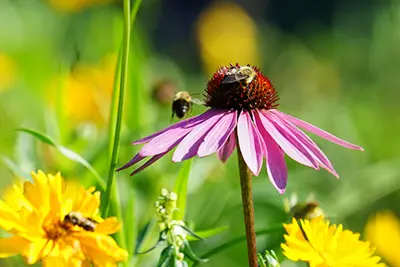Work Inspires Students to Create Their Own Climate Projects
 Image by Doris Jenkins
Image by Doris Jenkins
12/15/2022
By Brooke Coupal
Equipped with a tape measure, students from Sociology Assoc. Teaching Prof. Thomas Piñeros Shields’ newly launched Climate Crisis and Society course set out to collect tree data in downtown Lowell.
The information they gathered will help the city address urban heat islands, which, according to the United States Environmental Protection Agency, “occur when cities replace natural land cover with dense concentrations of pavement, buildings, and other surfaces that absorb and retain heat.” This increases heat-related illness, mortality, air pollution levels and energy costs.
“We live in this community, and we need to be committed to giving back to it,” says Shields, who reached out to Lowell Energy Manager Katherine Moses '12 ahead of the semester to find ways to get his students involved with a climate project in the city.
 Image by Doris Jenkins
Image by Doris Jenkins
They selected a project that involved collecting qualitative and quantitative tree data, which will help the city develop an urban forestry master plan to increase shade and mitigate the urban heat island effect. The project is funded by the state’s Municipal Vulnerability Preparedness grant program.
“This allowed the students to have a hands-on experience while doing something practical to move the needle on climate change,” says Moses, who got a master's degree in energy engineering at UML. “It was a fantastic partnership.”
The students agreed.
“It was great to meet in the city, where most of us aren’t from and to get to know it more and see how they’re tackling climate issues,” says William Lefebvre, a sophomore environmental science major from Lancaster, Massachusetts.
The students were inspired by their work with the city and went on to develop their own climate projects for the course.
“I had lectures and guest speakers lined up for the remaining classes, and I told the students, we could go on with the course the way it’s laid out, or we could create something on our own and be civic actors,” Shields says. “The students said, ‘We want to do more to continue to make a difference.’”
The students brainstormed project ideas before splitting up into four groups and getting to work.
Angelina Barletta, a junior criminal justice major from Dedham, Massachusetts, and Jessica Palazzolo, a senior music education major from North Reading, Massachusetts, were among the students who conducted a historical analysis of green space and society in Lowell. They discovered that the areas in Lowell most susceptible to the urban heat island effect are also areas with greater levels of poverty.
“They often do not have the resources to adapt to the higher temperatures fueled by climate change,” Barletta says. “We feel that action needs to be taken to provide adequate canopy cover in these areas to prevent people living in poverty from disproportionately suffering from climate change.”
 Image by Brooke Coupal
Image by Brooke Coupal
“There is so much going on behind the scenes, and we wanted to shed light on what those cities are doing to mitigate the effects of climate change,” says Laney Wyatt, a junior environmental engineering major from Billerica, Massachusetts.
Lefebvre and his group focused on sustainable transportation on campus. They surveyed 168 UMass Lowell faculty, staff and students and learned that an improvement in infrastructure would enhance their likelihood to bicycle or walk around campus and the city. The group proposed that the city add bicycle lanes on Pawtucket Street between East and South campuses and on the Howe Bridge between East and North campuses. They also recommended that the bicycle lane on Father Morissette Boulevard be repainted.
“We got a lot of feedback, and people are very passionate about implementing bike lanes,” Lefebvre says.
 Image by Brooke Coupal
Image by Brooke Coupal
“It’s important for us to give our input, and it’s also incredibly important for students in Dracut to be able to take college courses in high school, so they know a postsecondary education is an option,” Mendez says.
Each group presented their final projects at the Allen House at the end of the semester. Moses attended along with Doris Jenkins, a climate resiliency engineer with Weston & Sampson.
“I took lots of notes because they have a lot of really good ideas,” Moses said.
“You can tell with these presentations that the students care,” Jenkins added.




